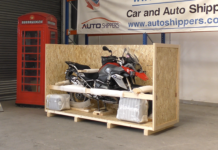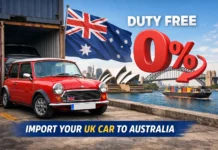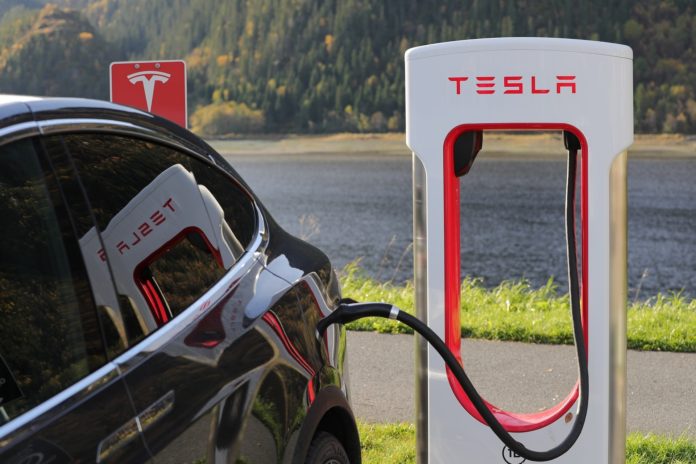Whether you believe that electric and hybrid vehicles are the future of motoring or not, there is no denying that they are becoming more and more popular. With improvements in the technology and the infrastructure to allow a user to charge their vehicle when and where they please, it is likely that this trend will continue.
At Autoshippers we are receiving more and more requests from customers looking to ship their electric vehicles overseas, and are being asked the same questions. So, we’ve put together the below guide to answer the question of How to Ship an Electric Car Overseas and other frequently asked questions about EV shipping.
The services outlined below assume that the destination country allows the import of electric cars. Some countries, like the USA, have strict guidelines on what vehicles are allowed in. If you are unsure of the relevant customs rules and regulations in your destination country, please contact us and we will give you the latest information for your chosen destination. It is imperative that you “know before you go!”
Contents:
- The Growing Popularity of Electric Vehicles
- How Are Electric Cars Different From “Normal” Cars?
- What Makes Shipping Electric Cars Different?
- Shipping Electric Vehicles (EVs) by Roll-on/Roll-off
- Shipping Electric or Hybrid Cars in Containers
- How Much Does it Cost to Ship an Electric Car Overseas?
- Electric Car Shipping Services at Autoshippers
Are Electric Cars Becoming More Popular?
As reported by the Institute of Export & International Trade in October 2022, UK car manufacturing output fell by 6% in September 2022, and this was the first decrease in output in 4 months. There was also a decline in exports by over 7%, with reductions in volumes shipped to the EU and US.
However, makers of electric and hybrid vehicles saw a growth in output of almost 10%, having a record share of 37.8% of the total output. Electric car exports now represent over a third of the value of all car exports.
Autoshippers are based on one of Europe’s largest car shipping ports at Portbury, Bristol. As of this year, for example, Mazda chose Bristol for its first direct UK import route, alongside their European direct ports Barcelona, Antwerp and Zeebrugge.
This includes imports of the Mazda 2 Hybrid model, which is currently being manufactured in France and will arrive into Bristol Portbury dock utilising Ro/Ro services (more detail on this further on in this article)
Despite a decline of overall used car sales of over 12% for the third quarter of 2022, sales of second-hand electric cars increased by 44%, and the market reached a record high according to the Society of Motor Manufacturers and Traders (SMMT).
You can see that electric and hybrid cars are becoming more prevalent in both the new and second-hand car marketplace, and due to the location of the main car company manufacturing plants, will be required to be shipped around the world, including into and out of UK ports such as Portbury.
How Are Electric Cars Different From “Normal” Cars?
A little bit of explaining first. An electric vehicle, or “EV”, is a vehicle that is either fully or partially powered using electricity. A partially electric-powered car, which runs on a mixture of electric and petrol/diesel power, is known as a Plug-in Hybrid Electric Vehicle (PHEV). These days, either type of electric vehicle is likely to be powered fully or partially by a Lithium Ion Battery.
“But my diesel car also has a battery”, I hear you say. In a standard petrol or diesel engine, the car battery is part of the starting process of a vehicle, and also provides power for things like lights, stereo etc when the engine is switched off.
In an Electric vehicle, the Lithium Ion Battery and electric motor replaces the requirement of a combustion engine powered by fossil fuels such as petrol or diesel. A PHEV runs on a mixture of battery and petrol/diesel power.
What Makes Shipping Electric Cars Different?
It is the Lithium battery in an electric or hybrid vehicle that makes it different to a standard petrol/diesel powered vehicle when shipping overseas. Lithium Batteries are considered dangerous cargo for shipping, including Lithium batteries that are in equipment, such as laptops, mobile phones and of course, electric or hybrid cars.
This is due to the potential of lithium batteries to overheat and ignite, and this has been blamed for fires on board aircraft and seagoing vessels causing the International Maritime Organisation and the International Air Transport Association to classify them as dangerous cargo for air and sea.
This doesn’t mean that you are unable to ship items, such as electric or hybrid cars, that have lithium batteries in them, it just means that there is certain legislation attached to the shipping of these goods. Some carriers may ask for documentation to be completed, and others may ask that the battery is below a certain “state of charge” (SOC) before they accept your car for shipping.
These regulations may change from time to time, so it is best to check at the time of quoting/booking.
Shipping Electric Vehicles (EVs) by Roll-on/Roll-off
Can I Ship an Electric or Hybrid Car via Ro/Ro?
The short answer? Yes, you can ship an electric or hybrid car via Ro/Ro and the cost is usually the same as a standard diesel/petrol car.
At Autoshippers we have shipped many electric vehicles on our Ro/Ro services, without the need for additional paperwork or added costs.
Ro/Ro services (Roll on / Roll off) use specially built vessels which allow vehicles to be driven on and off meaning that they do not need to be loaded into shipping containers. The vehicles are stowed below decks, and are securely lashed in place for safety during sea transport. You can find out more about how RoRo shipping works here:
https://www.autoshippers.co.uk/roro_car_shipping.htm
This shipping option is used by all major car manufacturers, including BMW, Audi, Renault, Porsche and Mazda, and car shipping companies worldwide and has become over recent years more and more popular due to worldwide container rates and issues with schedule integrity on container ships.
This also includes Tesla, who utilise Ro/Ro services from their manufacturing plant in China to European ports on a regular basis. In fact, according to CNN Business Tesla has now built one million cars in China some of which were for export to markets such as the UK and Europe and were safely shipped using Roll on Roll off (RoRo) vessels.
At the time of writing, however, some Ro/Ro carriers are now no longer taking sea freight bookings for used electric and hybrid vehicles. Hoegh Autoliners and Wallenius Wilhelmsen, who between them operate around 170 RoRo vessels, have advised Autoshippers that they will only accept bookings for new electric or hybrid vehicles and not used ones as
We have other options, such as K-Line who have a fleet of 79 Ro/Ro vessels over 20 trading routes, that will still take second-hand electric or hybrid vehicles as long as they are in sound condition and the state of charge is known and sufficient to load on and off the vessel.
Do I Have to Remove the Battery When Shipping Electric and Hybrid Cars on Ro/Ro Services?
The short answer is no.
Although classed as dangerous goods for container shipping, Ro/Ro carriers do not require to have the battery removed or disconnected for overseas transport, and we suggest it is not something that you should attempt if you are being told to do so.
If you take Tesla, for example, there are around 143 steps involved in removing the battery and a further 171 to put it back, according to electrek, which is a website covering the transition from fossil-fuel transport to electric transport.
This is a difficult and costly process, as you can see, so not cost-effective in any way if you are being advised that your best shipping option is the removal of your battery to ship as non-hazardous cargo, potentially in a shipping container. It may even invalidate any warranty you have and, in some cases, we have heard that to have the battery re-fitted a vehicle needed to be shipped back to the UK!
The removal of the battery is NOT an absolute requirement for Ro/Ro shipping, again making it the most cost-effective and easiest way to ship your electric or hybrid car overseas.
Should I Disconnect the Battery to Ship my Electric or Hybrid Car?
As we have discussed above, certain carriers may ask for different documentation and/or regulations to be followed before they accept bookings for electric or hybrid vehicles. However, we have found a general consensus that you do not have to disconnect the battery to ship an electric or hybrid car via sea freight or air freight.
In fact, some manufacturers of electric and hybrid vehicles have their own safety measures employed to prevent their batteries from being a danger during shipping. These include specialised sensors to disconnect the batteries if it detects that the temperature is too high, and an electronic cooling system.
Bear in mind though, that not all manufacturers may employ such safety devices, but even electric or hybrid cars manufactured by these companies do not generally need to have their batteries disconnected for shipping on Ro/Ro services. In all cases Autoshippers will advise you of all the necessary procedures and documentation required before we ship your vehicle.
Shipping Electric or Hybrid Cars in Containers
As well as our Ro/Ro services, we can also offer other shipping options for electric and hybrid cars. For some destinations, we have our R-RAK service, but for others you may need to opt for our dedicated container service (FCL).
Our R-RAK service is a groupage shipping service that enables up to 4 vehicles to be shipped in a standard 40’ shipping container. We can currently accept electric and hybrid vehicles on our R-RAK shipping services to Australia, New Zealand, South Africa, Cyprus and Hong Kong.
FCL services for different carriers currently have differing regulations for shipping electric and hybrid cars. Some carriers specify the maximum charge your battery should have for transport, some require additional documentation to be completed and others specify that the vehicle is loaded in specialised refrigerated containers, such as CMA CGM, who are the 3rd largest container shipping company in the world.
These different rules and regulations are likely to result in additional costs for shipping electric or hybrid cars on FCL services, but usually, for our R-RAK services, the cost is the same as a diesel/petrol car. Please check with us at the time of quotation, and we can give you all the options that are available for your preferred destination.
What Is the Cost of Shipping Electric or Hybrid Cars?
As explained above, for our FCL dedication shipping container services, there may be additional costs for shipping electric or hybrid cars, due to the additional regulations imposed by the carrier on your particular routing (for example if a refrigerated container is required)
Our R-RAK services, and our Ro/Ro services aren’t currently affected by additional costs for shipping electric and hybrid cars. Below gives you costs from port to port based on these services, as of today, but please request a quotation to confirm current pricing as freight costs can fluctuate;
| Destination | R-RAK | Ro/Ro |
| New York, USA | n/a | £1,148.00 |
| Auckland, New Zealand | £2,262.00 | £2,213.00 |
| Melbourne, Australia | £2,610.00 | £2,473.00 |
| Durban, South Africa | £1,667.00 | £1,740.00 |
| Jebel Ali, UAE | n/a | £1,556.00 |
Electric Car Shipping Services at Autoshippers
At Autoshippers we have been shipping our customer’s vehicles overseas for over 25 years, and keep up to date with current regulations for the whole shipping process, including carrier regulations and Customs clearance. This means that we are able to give you up-to-date advice on the best options available to you for shipping your electric or hybrid car overseas.
Our flexible shipping options, based on the world’s premier shipping companies, gives us regular scheduled sailing dates, in some cases with weekly departures. Our easy to complete quotation form means you can quickly and easily give us all the information needed to quote you 24 hours a day.
If you need to speak with us at any point, feel free to call on +44 117 982 8123 / 0800 389 0784 and you can discuss your specific requirement with one of our knowledgeable car shipping team members. You can even e-mail us at sales@autoshippers.co.uk so whichever time zone you are in we can answer any questions that you may have.













